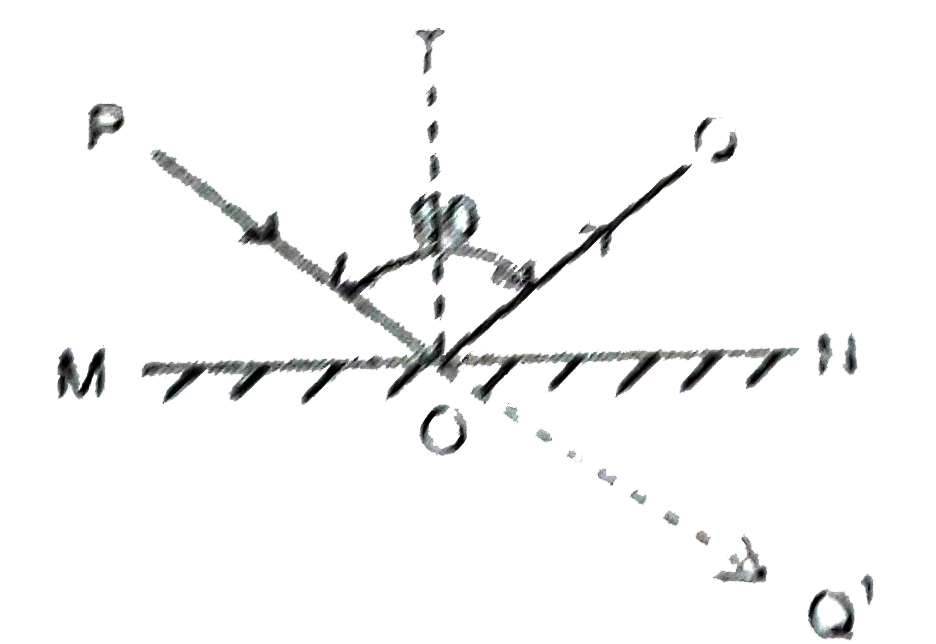A ray of light travelling with a speed c leaves point 1 shown in figure and is reflected to point 2. The ray strikes the reflecting surface at a distance x from point 1. According to Fermat's principle of least time, among all possible paths between two points , the one actually taken by a ray of light is that for which the time taken is the least (In fact there are some cases in which the time taken by a ray is maximum rather than a minimum).
_S01_060_Q01.png)
Which of the following statement is in accordance with Fermat's principle
A ray as it moves from one point to another after reflection takes shortest possible path
A ray as it moves from one point to another after reflection takes longest possible path
A ray as it moves from one point to another takes shortest possible time
A ray as it moves from one point to another takes longest possible time
The correct Answer is:A
Step by step video, text & image solution for A ray of light travelling with a speed c leaves point 1 shown in figure and is reflected to point 2. The ray strikes the reflecting surface at a distance x from point 1. According to Fermat's principle of least time, among all possible paths between two points , the one actually taken by a ray of light is that for which the time taken is the least (In fact there are some cases in which the time taken by a ray is maximum rather than a minimum). Which of the following statement is in accordance with Fermat's principle by Physics experts to help you in doubts & scoring excellent marks in Class 12 exams.
Updated on:21/07/2023Topper's Solved these Questions
- GEOMETRICAL OPTICSBOOK - ALLENCHAPTER - GEOMETRICAL OPTICSEXERCISE - EXERCISE -01
65 Videos
- GEOMETRICAL OPTICSBOOK - ALLENCHAPTER - GEOMETRICAL OPTICSEXERCISE - EXERCISE -02
82 Videos
- GEOMETRICAL OPTICSBOOK - ALLENCHAPTER - GEOMETRICAL OPTICSEXERCISE - subjective
14 Videos
- CURRENT ELECTRICITYBOOK - ALLENCHAPTER - CURRENT ELECTRICITYEXERCISE - All Questions
427 Videos
- GRAVITATIONBOOK - ALLENCHAPTER - GRAVITATIONEXERCISE - EXERCISE 4
9 Videos
Similar Questions
A ray of light is sent along the line which passes through the point (2, 3). The ray is reflected from the point P on x-axis. If the reflected ray passes through the point (6, 4), then the co-ordinates of P are
View SolutionA ray of light passing through the point (8,3) gets reflected after it meets x -axis at (14,0) .Then the equation of the reflected ray
View Solution
Knowledge Check
A ray of light travelling with a speed c leaves point 1 shown in figure and is reflected to point 2. The ray strikes the reflecting surface at a distance x from point 1. According to Fermat's principle of least time, among all possible paths between two points , the one actually taken by a ray of light is that for which the time taken is the least (In fact there are some cases in which the time taken by a ray is maximum rather than a minimum).
_S01_059_Q01.png)
Under what condition is time taken least?Aθ1=θ2Bx= l-xCY1−Y2Dall of theseA ray of light travelling with a speed c leaves point 1 shown in figure and is reflected to point 2. The ray strikes the reflecting surface at a distance x from point 1. According to Fermat's principle of least time, among all possible paths between two points , the one actually taken by a ray of light is that for which the time taken is the least (In fact there are some cases in which the time taken by a ray is maximum rather than a minimum).
_S01_058_Q01.png)
Find the time for the ray to reach from point 1 to point 2.A√Y21+x2+√(l−x)2+Y22cBlcCY1c+Y2cD2xcIf a light ray is reflected from a mirror as shown in the figure, then
 Athe glancing angle of light ray is 45∘Bthe reflected light ray is perpendicular to the incident light ray.Cthe reflected light is deviated through an angle of 90∘DAll of the above
Athe glancing angle of light ray is 45∘Bthe reflected light ray is perpendicular to the incident light ray.Cthe reflected light is deviated through an angle of 90∘DAll of the above
A ray of light, coming along the straight line 2x+3y=6, strikes at x -axis and reflects, then the equation of the reflected ray
View SolutionA light ray emerging from the point source placed at P(1,3) is reflected at a point Q in the axis of x. If the reflected ray passes through the point R(6,7), then the abscissa of Q is:
View SolutionIf a light ray is reflected from a mirror as shown in the figure, then

View SolutionPath taken in the eye ball by light rays is
View SolutionWhen a ray of light travelling parallel to the principal axis of a concave mirror strikes at the polished surface of mirror, the reflected ray
View Solution
